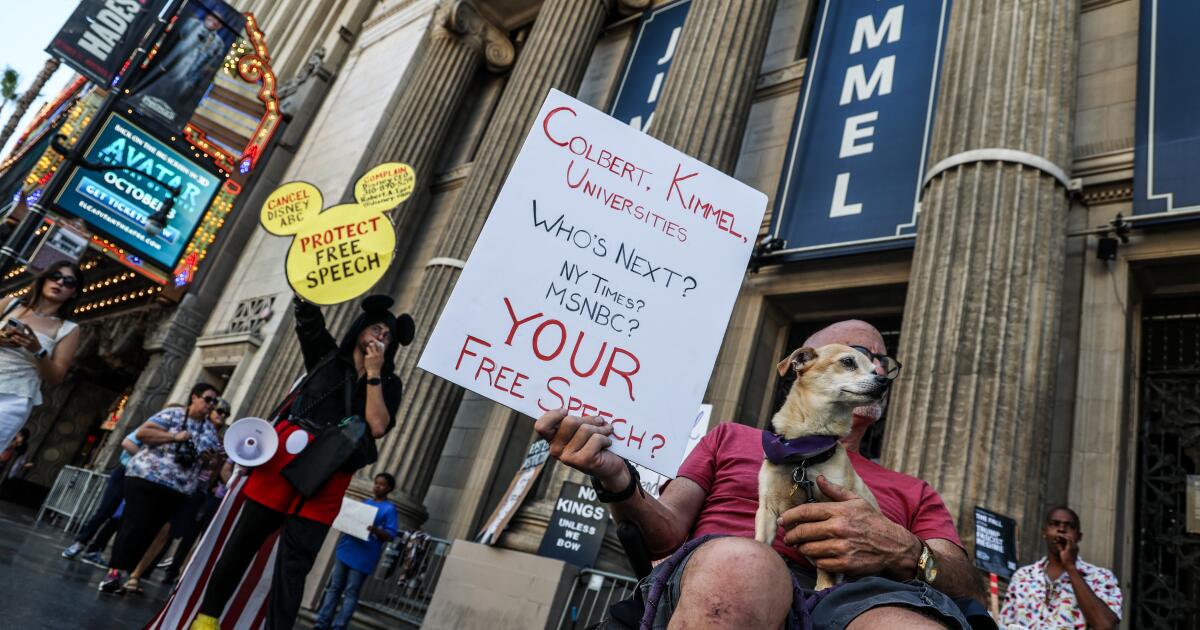Warner Bros. Discovery is up for sale. Why CEO David Zaslav isn’t ready to give up the reins
Paramount Chairman David Ellison’s latest offer to buy Warner Bros. Discovery contained a twist:
Should Paramount, backed by tech billionaire Larry Ellison, pull off the purchase, Warner Bros. Discovery Chief Executive David Zaslav could stay on to help lead the combined enterprise.
“They’re sweetening the pot,” Paul Hardart, a professor at New York University’s Stern School of Business, said of the Ellison family. “It just shows all the little arrows in their quiver they’re using to try to push this deal.”
David Ellison’ unexpected olive branch to Zaslav was contained in a letter this month to Warner Bros. Discovery’s board that offered $58 billion in cash and stock for the entire company. The move underscores the family’s determination to win the entertainment company that includes HBO, CNN and Warner Bros. film and television studios — and an obstacle in their path.
After hustling for decades to get to the big stage, Zaslav, 65, isn’t ready to relinquish the reins. He’s eager to prove critics wrong and complete a turnaround after three painful years of setbacks and cost cuts to reduce the company’s mountain of debt.
Warner Bros. Discovery board members, including Zaslav, have unanimously voted to reject Paramount’s three bids, viewing them as too low and not in the best interest of shareholders, according to two people close to the company who were not authorized to comment.
The board supports Zaslav’s desire to forge ahead with a planned split of the company next spring. But it also has opened the auction to other potential suitors, which is expected to lead to the firm changing hands for the third time in a decade.
Representatives of Zaslav, Warner Bros. Discovery and Paramount declined to comment.
David Ellison’s audacious offer is being guaranteed by his father, Larry Ellison, the world’s second richest man with a net worth that exceeds $340 billion. The Ellisons’ proposal includes paying 80% cash to Warner shareholders and the rest in stock, according to two people familiar with the matter who weren’t authorized to comment. The most recent offer was $23.50 a share.
The Ellisons began their campaign last month, just weeks after David Ellison’s Skydance Media, along with RedBird Capital Partners, picked up the keys to Paramount, which includes CBS, MTV, Nickelodeon and the Melrose Avenue film studio, which has been depleted by decades of underinvestment.
Since then, the 42-year-old Ellison has led Paramount on a buying bonanza, paying $7.7 billion for UFC media rights and $1.25 billion over five years to Matt Stone and Trey Parker to continue creating their cartoon “South Park.” It also wooed Matt and Ross Duffer, the duo behind “Stranger Things,” away from Netflix with an exclusive four-year deal. This week, it announced a planned East Coast expansion, signing a 10-year lease for a film and TV production center under construction in New Jersey.
The proposed addition of the more vibrant Warner Bros. would give the Ellisons an unparalleled entertainment portfolio with DC Comics including Superman, “Top Gun,” Scooby-Doo, Harry Potter, “The Matrix” and “The Gilded Age.”
The family would control streaming services HBO Max and Paramount+, nearly three dozen cable channels, including HGTV, Food Network and TBS, and two legacy news operations — CNN and CBS News.
It would also accelerate the trend of uber billionaires, including Amazon’s Jeff Bezos and SpaceX’s Elon Musk, of owning prominent news, entertainment and social media platforms. Larry Ellison also is part of a U.S.-based consortium lined up by President Trump to buy TikTok from its Chinese owners.
“If a trade deal with China is imminent, and TikTok would be aligned, then it would create a new media colossus, the likes of which we haven’t seen,” said veteran executive Jonathan Miller, chief executive of the investment firm Integrated Media Co.
Paramount is in talks to merge with Warner Bros. Discovery.
(Al Seib / Los Angeles Times; Dania Maxwell / Los Angeles Times)
The drama is unfolding as Paramount on Wednesday slashed 1,000 workers in the first round of cuts since Ellison took over. A second wave of layoffs — affecting another 1,000 workers — is expected in the coming weeks, helping fulfill a promise made to Wall Street by Ellison and Redbird to reduce expenses by more than $2 billion.
Combining with Warner Bros. would bring more layoffs, analysts said, and a potential hollowing out of a historic studio.
“Merger after merger in the media industry has harmed workers, diminished competition and free speech, and wasted hundreds of billions of dollars better invested in organic growth,” the Writers Guild of America West, said last week in a statement in opposition to the proposed unification. “Combining Warner Bros. with Paramount or another major studio or streamer would be a disaster for writers, for consumers, and for competition.”
Critics point to a long list of media merger misfires, including the disastrous AOL Time Warner merger a quarter century ago. Some critics contend Walt Disney Co.’s $71-billion purchase of much of Rupert Murdoch’s entertainment holdings didn’t live up to expectations, and AT&T whiffed its $85-billion deal for Time Warner, handing it to Zaslav’s Discovery four years later for $43 billion.
The New York native, a descendant of Jewish immigrants from Poland and Ukraine, had spent 16 years running the Discovery cable channel group, a respectable business, but one that lacked Hollywood flash.
Zaslav grew up on the fringe of New York City, in Ramapo, N.Y., where he’d been a promising tennis player who proudly wore his athletic gear to middle school. Tennis was his identity — until he started getting beat by players he used to whip.
Zaslav’s coach sat him down, bluntly saying he wasn’t putting in the work.
“I vowed that day I would never be outworked again,” Zaslav said during a 2023 commencement address to Boston University graduates. Underlings have long marveled at his indefatigable work ethic.
The speech was meant to be his triumphant return to his alma mater. Zaslav had finally made it to Hollywood, where he was now holding court in an exquisite corner office that had belonged to studio founder Jack Warner.
Zaslav had big plans to turn around Warner Bros. But, in Boston, he suffered a beatdown.
The Writers Guild of America had just gone on strike against his and other Hollywood studios. Protesters heckled Zaslav. Students booed. A plane flew overhead, waving a banner that read: “David Zaslav Pay Your Writers.”
He had assumed control a year earlier, in April 2022, just as Wall Street soured on media companies that were spending wildly to build streaming services to compete with Netflix.
Zaslav inherited a venture bleeding billions of dollars to get into streaming. The merger itself saddled the company with $55 billion of debt. Warner’s stock plummeted.
He and his team spent the first few years slashing divisions, canceling TV programs and contracts, and shelving movies. To further reduce expenses, the company laid off thousands of workers. Hollywood soon viewed Zaslav with derision.
It didn’t help that Zaslav has long been one of the most handsomely compensated executives in America.
There were high-profile stumbles, including jettisoning staff of the tiny Turner Classic Movies channel and an ill-conceived rebrand of its streamer to “Max” before changing the name back to HBO Max.
“The Warner Bros. Discovery merger was a well-intended failure,” Hardart said. “The cable subscriber base shrank at a faster rate than most people had forecast. … Thousands have lost their jobs, the HBO brand has been reimagined and reimagined, films have been mothballed and the future of the Warner Bros. studio is today uncertain.”
Warner Bros. Discovery paid down $20 billion in debt, but $35 billion remains. The debt load has nearly suffocated the company, making it a vulnerable target.
“There was a lot of fixing that David Zaslav and his team had to do,” Bank of America media analyst Jessica Reif Ehrlich said in a recent interview. “It’s been three years of incredibly heavy lifting — but that’s pretty much done now.”
In a note to investors last week, Ehrlich wrote Warner’s strong franchises, including DC Comics, and its voluminous library make it “an extremely attractive potential acquisition target,” one that could fetch $30 a share. Her firm carries a “buy” rating on the stock.
Warner Bros. Discovery Chief Executive David Zaslav and AT&T Chief Executive John Stankey shake hands on May 17, 2021, in New York City.
(Preston Bradford / Discovery)
Last summer, Zaslav announced plans to split the company in two halves.
Zaslav would run Warner Bros., which would consist of the Burbank studios, HBO and the HBO Max streaming service. Longtime lieutenant Gunnar Wiedenfels would helm Discovery Global, made up of the firm’s international businesses and basic cable channels, which face an uncertain future in the streaming era.
Those who know Zaslav believe he’s working to stave off the Ellison takeover, in part, because he wants the chance to bring the company back to its glory, which would ultimately make it more valuable for its investors and prospective buyers.
For Warner management, that’s part of the rub. The Ellisons showed up just as the company was displaying signs of a turnaround, including a hot streak by Warner Bros. that includes “A Minecraft Movie,” Ryan Coogler’s “Sinners,” James Gunn’s “Superman,” Formula One adventure “F1: The Movie,” and horror flick “Weapons.”
In addition, HBO returned to its winning ways at last month’s Emmys, collecting an industry-leading 30 awards, tied with Netflix.
Larry, from left, Megan and David Ellison attend the premiere of Paramount Pictures’ “Terminator Genisys” at Dolby Theatre on June 28, 2015.
(Lester Cohen / WireImage)
Ellison’s bidding was designed to thwart Warner’s planned corporate breakup.
For now, analysts said, Zaslav and the Warner board’s current strategy is solid because they have effectively driven up the stock price, which has doubled to $21 a share since the Ellison’s interest became known in mid-September.
“They are doing the right thing,” Hardart said. “In any sale, you try to beat the bushes and get as many people interested. But at some point the board is going to have to make a decision.”
Added one investor: “They’ve gotten Paramount-Skydance to bid against itself, and that only goes so far.”
Analysts expect Philadelphia giant Comcast, owner of NBCUniversal, and potentially Netflix, Apple or Amazon to take a look at the company’s studio, library and streaming assets.
But many see the Ellison’s Skydance as having the edge.
Paramount, in its recent letter to the Warner board, argued that it was the best and most logical buyer.
“What Skydance offers WBD, in many ways, is what it offered Paramount: The ability to be aggressive and push all aspects of the business in a way that most people or companies that have less capital just can’t do,” Miller said. “They are deploying real capital, and they are being the most aggressive folks in the industry right now.”

